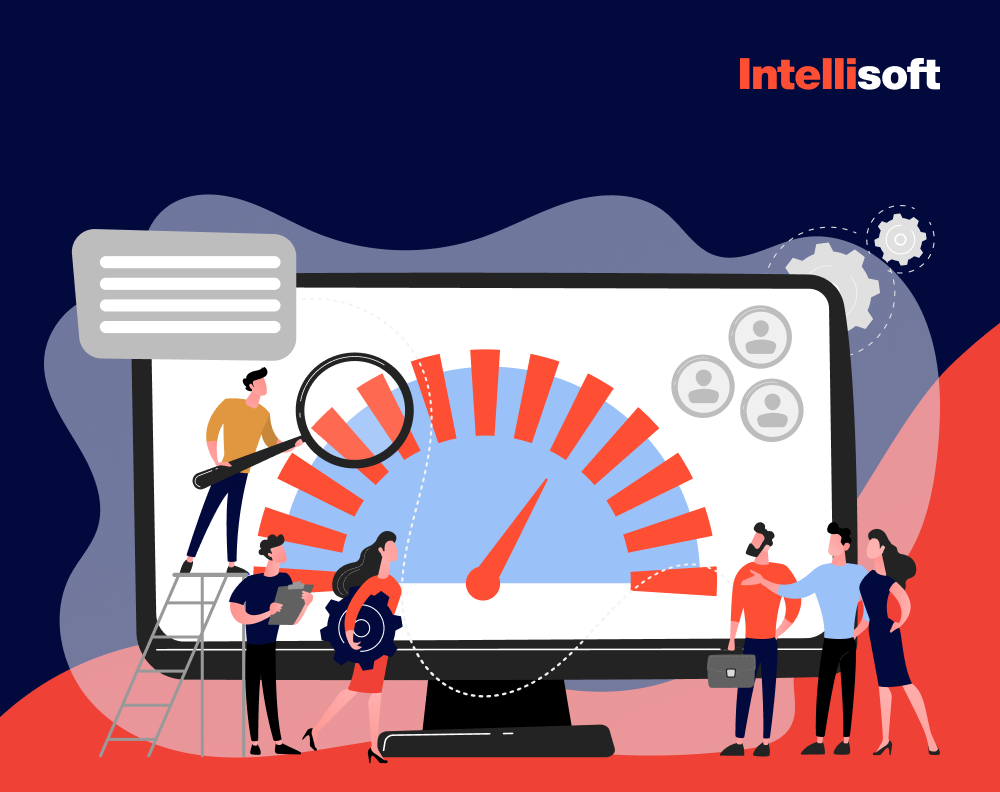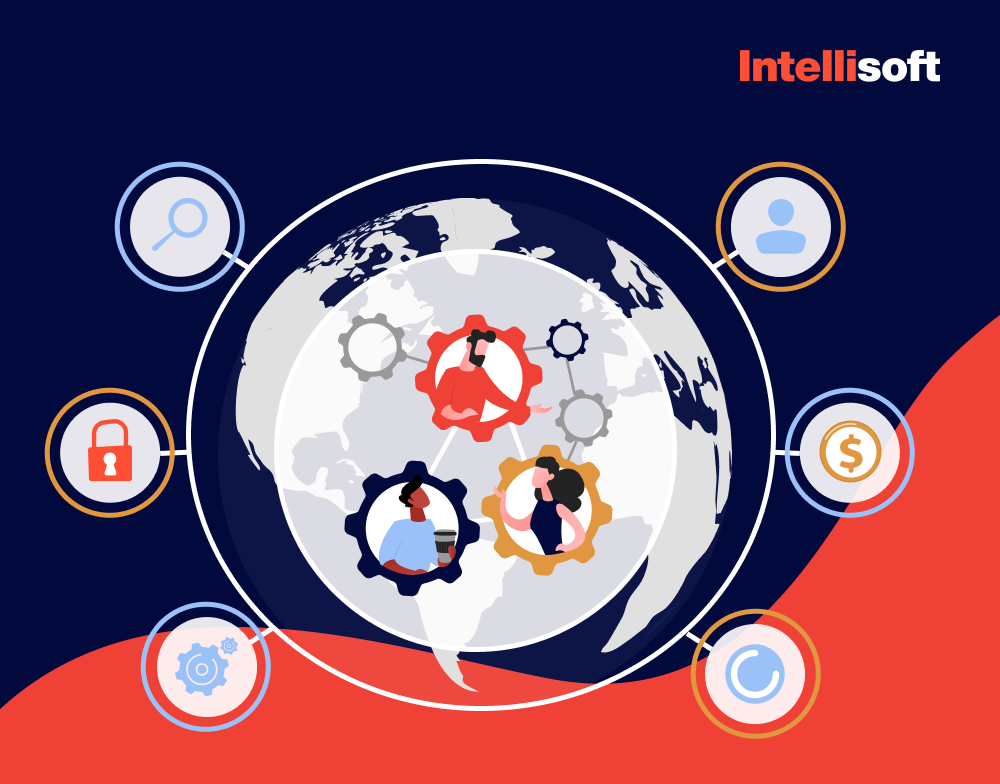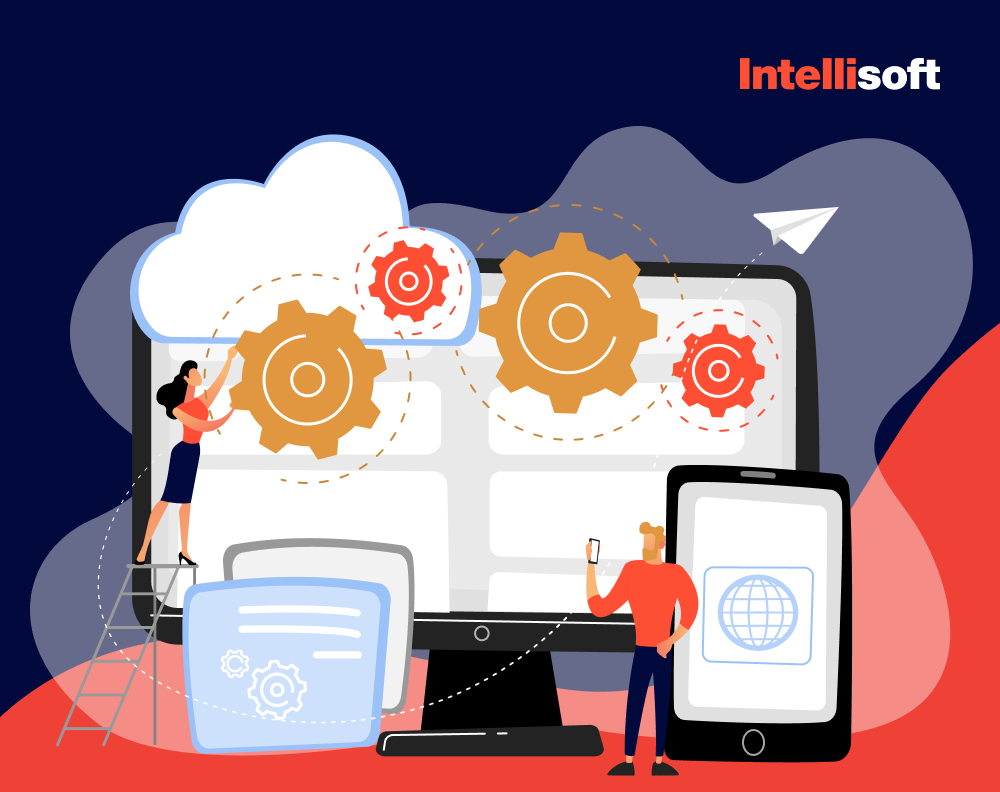Imagine your business as a high-performance race car. To win the race, you need a reliable engine, a skilled driver, and a pit crew that can swiftly address any issues. In the digital age, your IT infrastructure is that engine, your employees are the drivers, and your IT service provider is the pit crew.
An IT service provider is more than just a tech support team; they’re your strategic partner, helping you optimize your operations, secure your data, and stay ahead of the competition.
With IntelliSoft’s 15 years of experience, we’ve honed our skills to deliver exceptional IT services. Our team of experts is dedicated to understanding your unique business goals and providing tailored solutions that drive your success. Let’s explore what is an IT service provider is and how to find your perfect match.
Table of Contents
What is a Managed IT Service Provider
Looking for a “managed IT service provider near me”? Let’s explore the basics first.
A Managed IT Service Provider (MSP) is a company that outsources and manages an organization’s information technology (IT) infrastructure and operations. IT service provider companies provide a comprehensive range of IT services on a proactive basis, allowing businesses to focus on their core competencies while ensuring their technology runs smoothly and securely.
IT Managed Service Provider vs. Managed IT Service Provider
Although the terms “IT managed service provider” and “managed service provider” are often used interchangeably, understanding their nuanced differences can be key to making the right choice for your organization:
- IT Service Provider. This broad term encompasses any entity that offers IT-related services. This could include everything from selling hardware and software to providing consultancy and technical support. Essentially, a full service IT provider covers a wide spectrum of IT-related needs more centrally.
- Managed Service Provider (MSP). In contrast, a managed IT support service provider offers a more specialized approach. They deliver ongoing, proactive management of an organization’s entire IT infrastructure. Rather than reacting to issues as they arise, a managed IT service provider Derby anticipates and mitigates potential problems before they disrupt business operations.
Managed IT Service Provider vs. In-House IT Service Provider Company
For many businesses, the decision between maintaining an in-house IT team and partnering with a managed service provider IT is pivotal. Here’s why an MSP might be the smarter choice:
- Cost-Efficiency. Often, MSPs offer IT services at a fraction of the cost of an in-house team. This is particularly advantageous for smaller businesses or those with fluctuating IT needs, as MSPs can provide flexible, scalable solutions without the overhead of a full-time staff.
- Specialized Expertise. IT support managed service provider brings to the table a wealth of knowledge in specialized areas such as cybersecurity, cloud computing, and network management. This depth of expertise can be hard to match with an in-house team, particularly if your organization lacks the resources to recruit and retain top-tier IT talent.
- Scalability. As businesses evolve, so do their IT requirements. An IT support service provider offers the flexibility to scale services up or down, easily adapting to changing business needs.
- Proactive Maintenance. Unlike traditional IT support models that often react to problems after they occur, an IT cloud service provider implements proactive maintenance strategies. This forward-thinking approach helps to prevent issues before they impact operations, minimizing downtime and boosting overall IT performance.
- Enhanced Focus on Core Business. By offloading IT management to a managed IT service provider NYC, businesses can concentrate on their core activities and strategic goals. This shift in focus can drive growth and innovation, as resources are dedicated to areas that directly contribute to business success.
Why Companies Need IT Service Providers
Why do companies look for “IT managed service provider near me”? A managed IT service provider Orange County offers a lifeline, helping businesses save money, recover from disasters, and get the support they need without breaking the bank or stressing out their in-house teams.
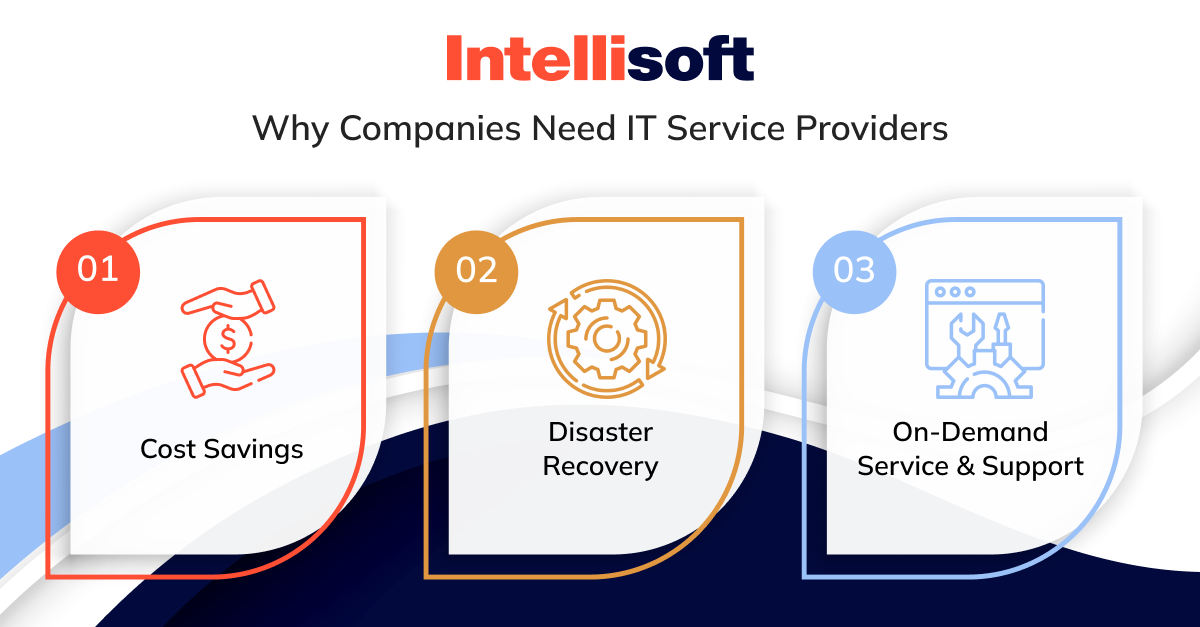
Cost Savings
Think of a managed service IT provider as your budget-friendly IT team. Imagine running a small business where you need top-notch tech support, but hiring a full-time IT specialist feels like overkill.
For example, a local coffee shop that needed to upgrade its point-of-sale system found that outsourcing its IT needs to a local IT service provider can save them thousands compared to hiring a full-time IT person. This way, they spent less on IT and more on expanding their menu and improving customer service.
Disaster Recovery
Picture this; your company’s server crashes before a big product launch. Panic sets in as you scramble to get things back on track. This is where an IT management service provider comes to the rescue.
For instance, a small marketing agency faced a data breach and lost critical client information. Thanks to their managed IT service provider Lincoln backup system, they could recover lost data and resume operations with minimal downtime, avoiding potential damage to their reputation and client relationships.
On-Demand Service & Support
When tech troubles hit, waiting for help can be a major headache.
Imagine running an online store and suddenly facing a technical glitch that affects checkout. With 24/7 support from an IT infrastructure service provider, you get immediate assistance, preventing lost sales and frustrated customers. This on-demand service ensures that your tech issues are resolved quickly so you can focus on what matters – growing your business.
Related Readings:
- Outsourcing vs Offshoring: Discover Which Model Maximizes Efficiency?
- Best Countries To Outsource Software Development
- Hire Developers for Startup: Key Strategies for Success
- Everything You Need to Know About Team Extension and Dedicated Team Models
- Outsourcing vs. Outstaffing Models: What Is the Difference and Their Pros & Cons
When to Cooperate With IT Service Providers?
Knowing when to bring in an outsourced IT service provider can make all the difference between tech headaches and smooth sailing. Here’s when it’s time to consider partnering with an IT service provider:
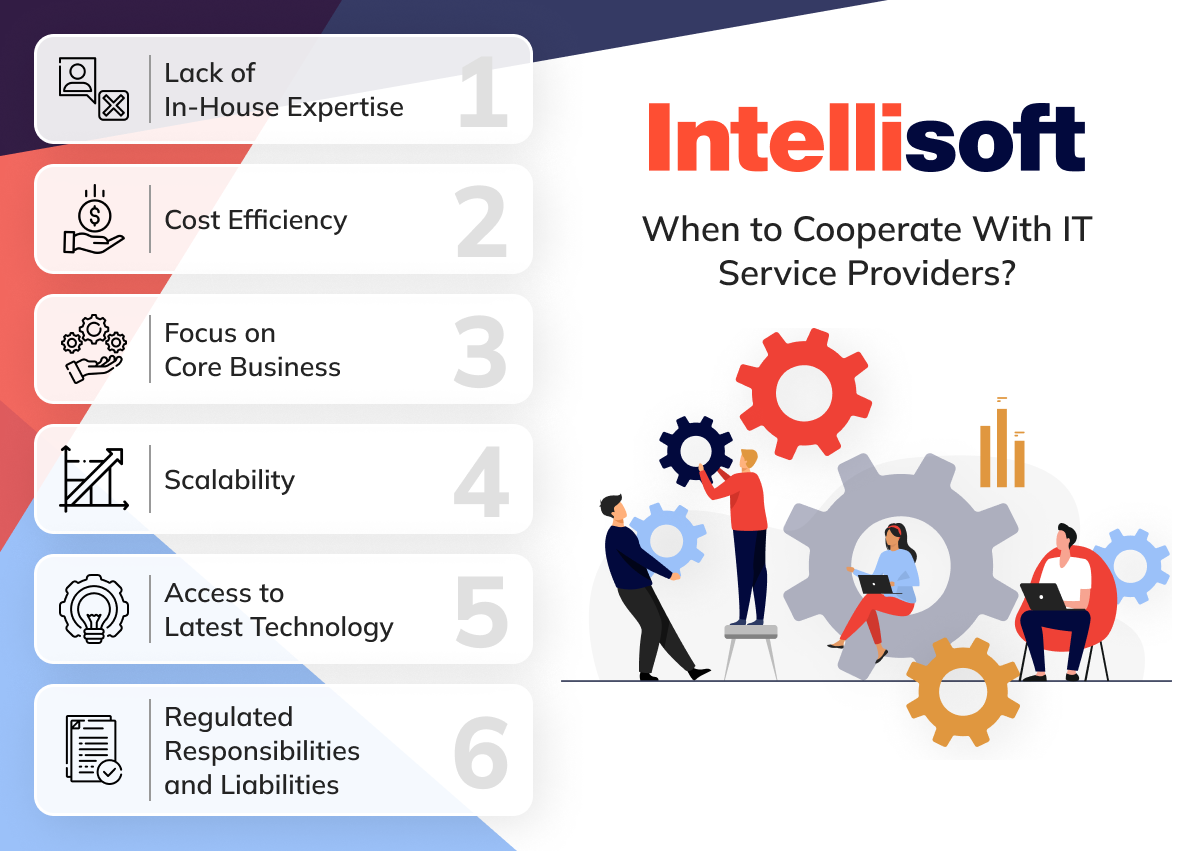
Lack of In-House Expertise
If your team struggles with tech issues or lacks specialized skills, it might be time to call in the experts. For example, a startup with a small IT team might find themselves overwhelmed with cybersecurity threats they’re not equipped to handle. An IT managed service provider London can bring the necessary expertise to tackle complex issues and ensure your tech is secure and functioning optimally.
Cost Efficiency
Running a business means balancing budgets; sometimes, keeping an in-house IT team isn’t the most cost-effective solution. Imagine a growing retail business that needs to upgrade its IT infrastructure but can’t justify the expense of a full-time IT department. By outsourcing to an IT managed service provider Long Island, they can access the same high-level support at a fraction of the cost, freeing up resources for other critical areas like marketing or product development.
Focus on Core Business
If managing IT distracts you from your core business activities, it’s time to consider outsourcing. For instance, a law firm specializing in complex legal cases might find its time and energy better spent on client cases rather than IT issues. By outsourcing IT management to an IT managed service provider Toronto, they can concentrate on providing top-notch legal services while leaving tech troubles to the professionals.
Scalability
As your business grows, so do your IT needs. An IT consulting service provider can offer the flexibility to scale services up or down based on your requirements. For example, a tech startup experiencing rapid growth may need to expand its IT resources to support new projects and team members. An IT provider can adjust their services to match the company’s evolving needs, ensuring smooth transitions and continued efficiency.
Access to Latest Technology
Staying ahead of technological advancements can be challenging, especially if your in-house team isn’t up-to-date with the latest trends. Consider a financial services firm that needs cutting-edge data analytics tools to stay competitive. Partnering with an IT service provider Dallas ensures they have access to the latest technologies and innovations without constantly having to upgrade their own systems or retrain staff.
Regulated Responsibilities and Liabilities
Managing those responsibilities internally can be daunting if your business operates in a regulated industry with strict compliance requirements. For example, a healthcare provider dealing with sensitive patient information must adhere to strict regulations. A managed IT service provider Dallas with experience handling regulated environments can help ensure compliance, manage risks, and protect your business from potential liabilities.
Questions to Ask Your IT Service Provider
Choosing the right IT security service provider can significantly impact your business’s efficiency and security.
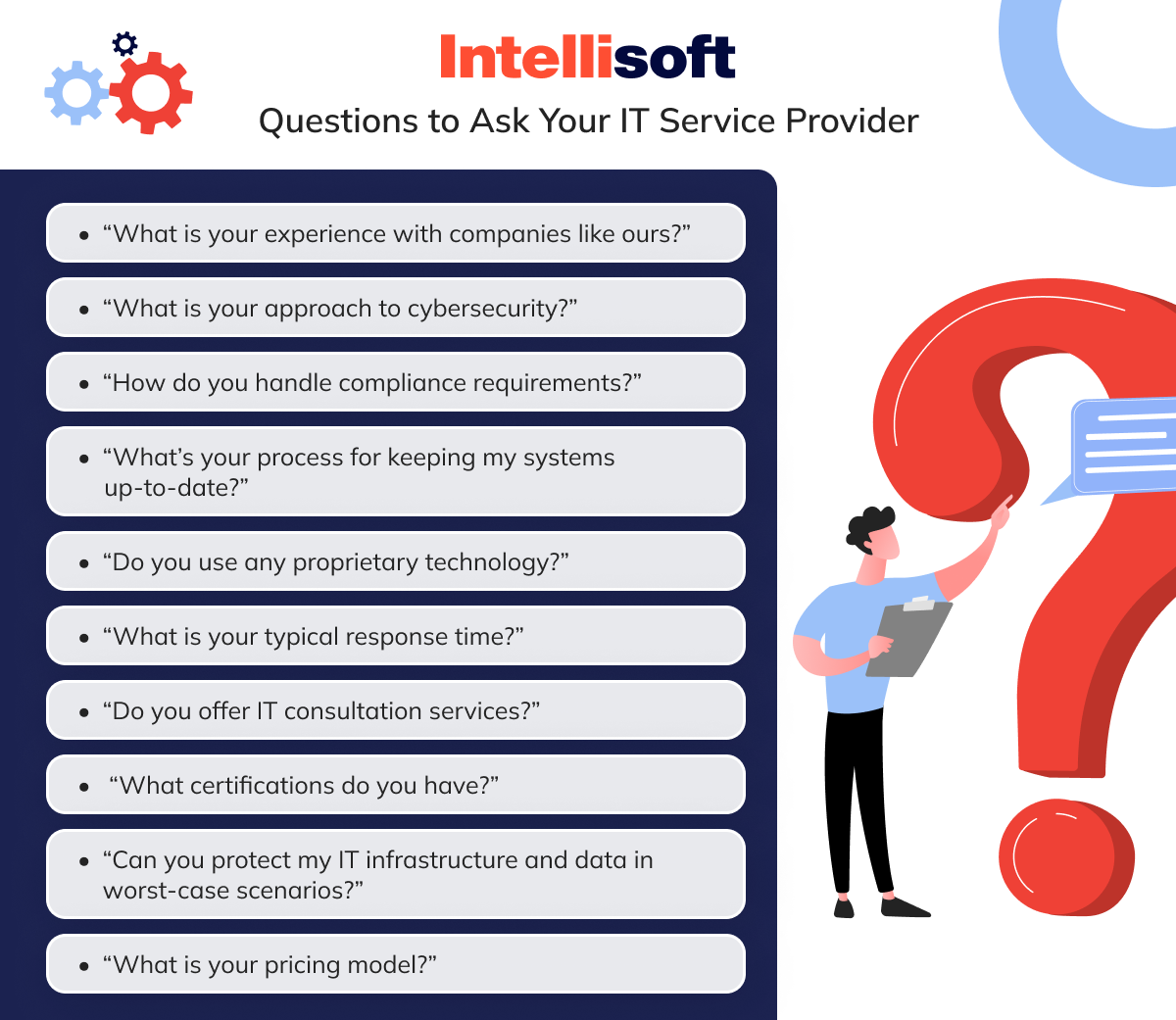
“What is your experience with companies like ours?”
Understanding a provider’s experience with businesses similar to yours can be a game-changer. Ask the IT service provider marketing agency about their track record with companies in your industry to gauge their familiarity with your specific challenges and needs. For example, if you run a healthcare practice, it’s essential to know if they have experience handling the complex IT demands of healthcare organizations, including patient data management and compliance with HIPAA regulations.
“What is your approach to cybersecurity?”
Cybersecurity is a top priority for any organization, and knowing how your IT service provider manages this aspect is crucial. Ask about their use of advanced encryption methods, regular security audits, and strategies for managing potential vulnerabilities. For instance, inquire if the managed IT service provider San Jose employs multi-factor authentication and continuous monitoring to safeguard your sensitive information.
“How do you handle compliance requirements?”
If your business operates in a regulated industry, ensuring your third party IT service provider is well-versed in compliance requirements is essential. Ask about their processes for managing compliance with industry-specific regulations. For example, if you’re in finance, confirm their familiarity with regulations like GDPR or SOX and how they ensure your IT infrastructure meets these standards.
“What’s your process for keeping my systems up-to-date?”
Ask about their strategy for managing software updates, security patches, and hardware upgrades. For instance, find out if they follow a scheduled maintenance plan or offer automatic updates to ensure your technology remains up-to-date and fully operational.
“Do you use any proprietary technology?”
It is important to understand whether your IT provider uses proprietary tools or technology. Proprietary systems can sometimes limit your flexibility or create dependencies. Ask if they rely on their software or systems and how this might impact your integration with existing tools or affect your long-term strategy. For example, if they use a proprietary network management tool, ensure it’s compatible with your current setup and doesn’t lock you into their services.
“What is your typical response time?”
Response time is a critical factor in managing IT issues effectively. Inquire about their average response time for support requests and whether they offer 24/7 support. For example, an e-commerce business that experiences a website outage needs to know how quickly they can expect the managed IT service provider Rotherham to address and resolve the issue.
“Do you offer IT consultation services?”
IT consultation can provide valuable insights into optimizing your technology strategy and planning for future growth. Ask if they offer advisory services to help you make informed decisions about technology investments and improvements. For example, the IT outsourcing service provider might assist in planning for scalability, integrating new technologies, or optimizing your IT infrastructure for better performance and efficiency.
“What certifications do you have?”
Certifications can serve as a benchmark for the provider’s expertise and professionalism. Ask about their relevant certifications, such as CompTIA, Microsoft Certified Professional, or Cisco Certified Network Associate. These certifications indicate a high level of technical competence and adherence to industry standards, giving you confidence in their ability to effectively manage and support your IT needs.
“Can you protect my IT infrastructure and data in worst-case scenarios?”
Knowing how your provider handles worst-case scenarios, such as data breaches or system failures, is crucial for business continuity. Ask about their disaster recovery plans and data protection strategies. For example, find out if they have a robust backup system, regular data recovery tests, and a clear plan for managing and mitigating disruptions.
“What is your pricing model?”
Price clarity helps avoid unexpected costs and ensures your budget aligns with the services provided. Ask about their pricing structure – whether it’s a flat fee, pay-as-you-go, or based on specific services. Understanding their pricing model will help you plan your budget effectively and ensure no surprises in your IT expenditure. For instance, knowing if the IT service provider UK charges extra for additional support or emergency services can help you avoid unexpected expenses.
Hiring IT Service Providers: Key Cooperation Models To Choose
Finding the perfect IT service provider Sydney is only half the battle – choosing the right cooperation model is where the real magic happens. The model you choose sets the stage for how you’ll collaborate, how flexible you can be, and ultimately, how smoothly your project will run. Let’s explore some of the most common cooperation models and see which might be the best fit for your needs:
Fixed Price
What Is It?
Imagine setting out on a road trip with every detail mapped out – your route, stops, and even the gas you’ll need. That’s the Fixed Price model in a nutshell. Here, you agree on the destination, and the IT service provider gives you a flat fee for the entire journey.
Why You’ll Love It
- Peace of Mind. No surprise expenses. The price is locked in, so you can relax knowing the budget won’t balloon unexpectedly.
- Clear Expectations. You know exactly what you’re getting, down to the last feature, which keeps everyone on the same page.
- Lower Risk. The provider takes on the risk of delivering the project on time and within budget, so you’re covered.
What to Watch Out For
- Less Wiggle Room. If you suddenly want to take a scenic detour (aka change the project scope), it could cost you extra time and money.
- Rigid Structure. This model works best for projects where you’re confident nothing will change along the way.
- Front-Loaded Work. You’ll need to do a lot of planning upfront to nail down every detail before you get started.
Perfect For
A company wanting to launch a new app with well-defined features might choose Fixed Price. With a clear vision in mind, they can ensure everything stays on track – and on budget – right from the start.
Dedicated Team
What Is It?
Think of the Dedicated Team model like having a band that plays just for you. You get a group of experts – developers, designers, you name it – who are exclusively focused on your project, jamming together to create something amazing.
Why You’ll Love It
- Tailored Expertise. You’re not just getting a one-size-fits-all solution. This team knows your project inside and out.
- Room to Grow. Need more hands on deck or a different skill set? You can easily adjust the team as your project evolves.
- Deep Collaboration. Over time, this team becomes an extension of your own, leading to better synergy and smoother operations.
What to Watch Out For
- Cost Factor. You’re paying for dedicated expertise, which can be pricier than other models.
- Management Load. You’ll need to be hands-on in managing this team, making sure everything stays on track.
- Reliance Risks. If you rely too much on the external team, transitioning back to in-house could be tricky.
Perfect For
A startup in the middle of developing a cutting-edge SaaS platform might go for a Dedicated Team. This way, they get the specialized skills and focus they need without hiring a whole new in-house team.
Time and Material (T&M)
What Is It?
Picture this; you’re sculpting a piece of art. You don’t know exactly how it will turn out, but you’re shaping it as you go, adjusting based on what feels right. That’s the essence of the Time and Material (T&M) model – paying for the actual hours and materials used as your project takes shape.
Why You’ll Love It
- Ultimate Flexibility. As your vision evolves, so can the project. No need to lock in every detail from the start.
- Cost Transparency. You see exactly where your money is going, with a breakdown of time and resources spent.
- Focus on Quality. You’re not just ticking boxes—you’re refining and improving the work as it progresses.
What to Watch Out For
- Budget Creep. Without a fixed budget, costs can spiral if you’re not careful.
- Close Supervision Needed. You’ll need to keep a close eye on the project to ensure it stays within your desired budget and timeline.
- Risk of Scope Creep. With so much flexibility, there’s a chance the project could expand beyond its original intent.
Perfect For
A business undergoing digital transformation might opt for T&M. The flexibility allows them to adapt and fine-tune their project as they discover new needs or opportunities along the way.
Hybrid Model
What Is It?
The Hybrid model is like combining the best parts of two great recipes into one dish. You get the predictability of Fixed Price for certain elements, with the flexibility of T&M for others. It’s a custom blend that gives you the best of both worlds.
Why You’ll Love It
- Balanced Approach. You can lock in costs for parts of the project where you have clarity, while keeping things flexible where you need it.
- Cost Efficiency. You get the predictability of a fixed price, but with room to maneuver where necessary.
- Tailored Fit. This model can be adjusted to suit the unique needs of your project, making it a versatile choice.
What to Watch Out For
- Complex Coordination. Juggling the fixed and flexible parts of the project can be tricky and requires careful management.
- Potential Conflicts. If not managed well, different pricing structures could cause friction between you and the provider.
- Expert Handling Required. Both you and the provider need to be savvy about how to make the most of this model.
Perfect For
A large corporation implementing a new enterprise software solution might choose a Hybrid model. They can fix the cost for core system setup, while using a T&M approach for customization and additional features, ensuring they get exactly what they need without overspending.
Cooperation Models in IT: What To Choose?
Choosing the right cooperation model with a healthcare IT service provider is like picking the perfect strategy for your race. Each model offers distinct advantages tailored to different types of projects. Here’s how to select the best one for your needs:
What Projects Should Use the Fixed-Price Model?
Think of the Fixed-Price model as your blueprint for a well-planned journey. It’s perfect for projects with a clear scope and defined requirements. This model is ideal when you have a precise vision and want to lock in costs without any surprises.
Best For
- New Product Launches. If you’re developing a new application or software with clearly defined features and functionalities, the Fixed-Price model ensures that your budget stays intact while delivering exactly what you envisioned.
- Short-Term Projects. Projects with a set timeline and scope, like implementing a new CRM system, benefit from the predictability and structure of a Fixed-Price agreement.
- Well-Defined Specifications. If you know exactly what you need and are confident there won’t be any major changes, this model provides clarity and peace of mind.
What Projects Should Use the Dedicated Team Model?
Imagine having a dedicated team of experts who are solely focused on your project, like having a specialized crew for your unique race car. The Dedicated Team model is ideal when you need ongoing collaboration and a team that adapts to your evolving needs.
Best For
- Long-Term Projects. For ongoing development or projects that will evolve over time, such as a SaaS platform that requires continuous enhancement, the Dedicated Team model offers flexibility and deep integration with your business.
- Complex Projects. When your project involves multiple phases or intricate requirements, having a dedicated team ensures specialized attention and consistent progress.
- Customization and Flexibility. If you anticipate frequent changes or need a team that can adapt and scale with your project, this model provides the flexibility to adjust resources and expertise as needed.
What Projects Should Use a Time and Material Model?
The Time and Material (T&M) model is like sculpting a masterpiece—adjusting and refining as you go. It’s ideal for projects with evolving requirements or uncertain scopes, where flexibility and ongoing adjustments are crucial.
Best For
- Digital Transformation. Projects that involve significant changes or modernization of existing systems, where needs and priorities might shift as you progress, are well-suited to the T&M model.
- Research and Development. If your project involves experimentation or innovative solutions, the T&M model allows for iterative development and refinement based on ongoing findings and feedback.
- Emergent Needs. For projects where new requirements or challenges may emerge, such as integrating new technologies or pivoting business strategies, the T&M model provides the adaptability needed to address evolving demands.
Comparing the Pros and Cons
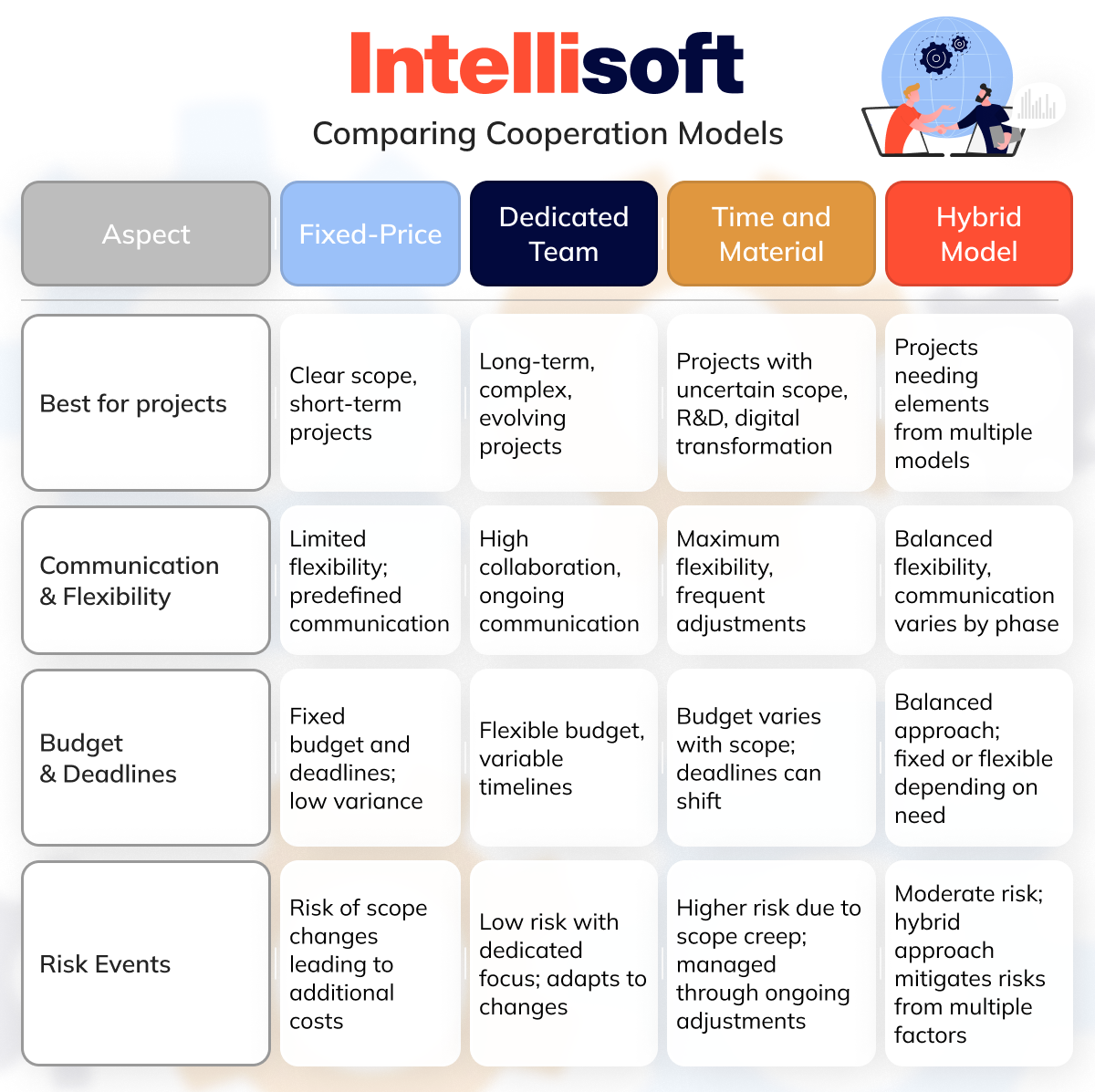
Consider IntelliSoft Your Trusted Partner
At IntelliSoft, we don’t just complete projects; we build partnerships.
We’ve walked alongside businesses of all sizes, from emerging startups to established enterprises, helping them navigate the complexities of IT development. Our approach is simple: listen first, understand your goals, and then craft a solution that fits like a glove.
Our IT service provider Chicago team is made up of passionate professionals who thrive on challenges. Whether it’s developing an MVP to get your idea off the ground or re-engineering a legacy system, we bring expertise, dedication, and a personal touch to every project.
We work closely with you to find the cooperation model that best suits your needs, ensuring that your project stays on track, on budget, and aligned with your goals.
Here’s a glimpse of what we offer:
- A collaborative discovery phase that gets to the heart of your product in just two weeks
- Rapid MVP development to bring your vision to life in two to three months
- Innovative cloud solutions tailored to your business needs
- User-centered design that prioritizes your customers’ experience
- Proof of Concept (POC) that’s rooted in deep analytics and modeling
- Full-cycle web and mobile development with ongoing support
- Comprehensive legacy system re-engineering to keep your tech stack future-proof
But don’t just take our word for it – explore our portfolio and see how IntelliSoft has helped clients across industries achieve their IT goals. Contact us and let’s work together to turn your ideas into reality.


